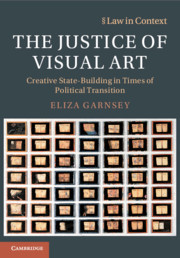Description
The Justice of Visual Art
Creative State-Building in Times of Political Transition
Law in Context Series
Author: Garnsey Eliza
Drawing on novel case studies, this book provides the first substantive theoretical framework for understanding transitional justice and visual art.
Language: English
Subject for The Justice of Visual Art:
Approximative price 26.37 €
In Print (Delivery period: 14 days).
Add to cart
The Justice of Visual Art
Publication date: 04-2021
Support: Print on demand
Publication date: 04-2021
Support: Print on demand
Approximative price 120.27 €
In Print (Delivery period: 14 days).
Add to cart
The Justice of Visual Art
Publication date: 11-2019
246 p. · 17.8x25.3 cm · Hardback
Publication date: 11-2019
246 p. · 17.8x25.3 cm · Hardback
Description
/li>Contents
/li>Biography
/li>
In the aftermath of mass conflict how is it possible to address violent and traumatic pasts, reconcile divided nations, and strengthen state institutions? This study explores the connections between transitional justice and visual art in order to answer that question. Garnsey argues that art can engage and shape ideas of justice. Art can be an inquiry into, and an alternative experience of, justice. Art embeds justice on different political levels - both local and global. Art becomes a radical form of political participation in times of transition. Arising out of extensive fieldwork at the Constitutional Court of South Africa and the South Africa Pavilion at the Venice Biennale, which included 130 interviews with key decision makers, the book provides the first substantive theoretical framework for understanding transitional justice and visual art, and develops novel conceptions of visual jurisprudence and cultural diplomacy as forms of transitional justice.
1. Introduction; 2. Art and justice in times of transition; Part I. Recognising Transitional Justice in the Nation State: 3. From prison to court; 4. Shaping 'legal' space; 5. The art of recognition; 6. The visual jurisprudence of transition; Part II. Representing Transitional Justice on the Global Stage: 7. From banned to embraced; 8. Mapping political art-scapes; 9. The art of representation; 10. The cultural diplomacy of Imaginary Fact; 11. Conclusion.
Eliza Garnsey is a British Academy Postdoctoral Fellow in International Relations at the University of Cambridge and is Junior Research Fellow at Wolfson College, Cambridge. She was previously awarded the 2017 Lisa Smirl Ph.D. Prize for best thesis in Politics and International Studies, University of Cambridge.
© 2024 LAVOISIER S.A.S.




